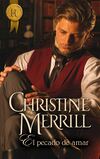Читать книгу: «Regency Pleasures and Sins Part 1», страница 46
Chapter Thirteen

Disengaging her hand, Mrs. Martin backed away from the vicar—straight toward Beau. Recovering his frozen wits in an instant, he leaped aside to flatten himself against the staircase wall, knowing it imperative he remain hidden until he’d sorted out what to do about this extremely disagreeable development.
His first furious reaction—to stalk into the parlor, seize Reverend Blackthorne by his shirt collar and haul him bodily out of the cottage—he quickly discarded as impolitic, if eminently satisfying. His second thought was a throat-drying fear that in his self-absorbed concentration on maneuvering Mrs. Martin into the sort of relationship that would best satisfy his desires, he’d let this underestimated rival steal a perhaps insurmountable advantage over him.
If Blackthorne did in fact assuage Mrs. Martin’s distrust of men by offering marriage, and she accepted him, how was Beau to counter that? He might lose her before he’d barely had a chance to press his own claims.
Cold purpose focused him, let him shake his mind free of angry dismay. There had to be some way to stop this. Without a particle of remorse, he focused on overhearing as much as possible of the conversation.
“Please, Mr. Blackthorne, I beg you proceed no further,” said Mrs. Martin, distress in her cool voice.
That reassuring request was followed by the soft pad of Mrs. Martin’s footsteps, but in his current position Beau could not see where the occupants of the parlor now stood. Move away from him, he silently urged.
“Surely my feelings cannot come as a surprise,” Blackthorne said, a bit of reproach in his tone. “I’ve long held you in esteem, as our dealings with each other must have shown.”
“I felt you esteemed me as a member of the community who attempted to assist those in need, as I esteem you,” she replied. “Nothing more.”
“Perhaps I was not as … forthcoming as I should have been,” he conceded. “A man of my position must naturally be circumspect to avoid becoming fodder for the local gossips. But I regret that restraint, if it left you in ignorance of the steadily increasing warmth of my regard. So much that I must beg you let me continue!”
Beau heard heavier footfalls, and grimly concluded the reverend must have pursued Mrs. Martin. “Please, sir—”
“No, dear lady, you must allow me voice! Granted, had certain … events not transpired I should not have chosen to approach you in so precipitous a manner, but at this critical moment both personal desire and my duty as your spiritual advisor demand that I address you now.”
Beau heard Mrs. Martin’s ragged sigh. “Continue then, if you must.”
“I beg you will acquit me of conceit if I state what I see are the advantages to you of this match. At this moment I occupy a position which might appear to offer little worldly gain, but I have an income independent of this living and the ear of my father, who is, I assure you, a most influential man. My wife and children will want for nothing. For months I’ve been increasingly drawn by your modesty, excellence and nobility of character, a beauty of soul surely the equal of your lovely countenance. I think we could pursue a common purpose. While I cannot claim to be without flaws, I hope I bear no more than my human share. Should you do me the honor of becoming my wife, I should earnestly strive to make you happy.”
Though Beau could hardly have hoped the vicar would offer a lady of his parish carte blanche, still the formal proposal shook him to his boots. A widow in Mrs. Martin’s tenuous position, unless she held her suitor in absolute abhorrence, would be a fool to refuse such an offer.
Torn between dismay and hopeless anger, Beau waited in wretched silence for the inevitable acceptance.
“Mr. Blackthorne, please understand I am fully cognizant of the brilliance of your offer. A woman who occupies as humble a position as I could not help but be honored that a man of your birth and position would consider her for his wife, but—”
“You are a lady born, as any gentleman could see, quite worthy to be offered a man’s hand and name,” Blackthorne said with some heat.
“Thank you, sir. But flattering as it is, I—I must decline your proposal.”
Beau sagged back against the wall, shock and gladness weakening his knees. He could not imagine why she would reject so clearly advantageous an offer, but at this moment, having little doubt that Reverend Blackthorne would probably attempt to persuade her otherwise, he focused all his thoughts on willing her to persist in refusing it.
“You … find me disagreeable?” Despite himself, Beau felt a grudging sympathy at the mingled pain and humility in the reverend’s voice.
“No, of course not. It’s just …” Beau heard her soft, quick step, as if she were pacing the room. “I … can only tell you that my … experiences with the wedded state were such that I cannot envision ever entering it again. Pray, do not press me further.”
So Ellie was right—her marriage had not been happy. Apparently the vicar had not been aware of it, for several moments of silence followed her declaration.
“My dear lady, I deeply regret any unhappiness you may have suffered,” he began again, apparently taken aback but undaunted. “Still, I vow that if you will but entrust your future to me, I will do all in my power—”
“Sir, I beg you say no more! My resolve on this matter is unshakable.”
“If you forbid me speak, I must honor that request, but you cannot silence me on a matter of even graver import. No, madam—” Beau heard the soft tones of her protesting voice under the vicar’s more strident ones “—this must be said. It has not escaped me that recently you have become the object of interest to … a man of great position. Indeed, he has singled you out to a degree that has already begun to cause speculation in the neighborhood. I must warn you that I seriously question this nobleman’s intentions toward you.”
“Indeed, sir, I am sure you are mistaken!” Mrs. Martin’s gratifying prompt response mitigated Beau’s immediate desire to spring from his hiding place and plant the disparaging reverend a facer. “I am much too far beneath that person’s notice,” she continued, “for him to have any designs upon my person whatever. I agree that both he and his sister have singled me out to an extraordinary degree, but that is only because of the service I’ve rendered their kinsman.”
“Dear Mrs. Martin, it does honor to the purity of your character that you view Lord Beaulieu’s actions in that light, but in this you must bow to my superior knowledge of the world. I have closely observed the manner in which his lordship looks at and treats you. I wasn’t called to the church until after I’d been some years on the town, and speaking as a fellow aristocrat who knows how such men’s minds work, I assure you in the strongest possible terms that you do indeed stand in danger.”
Another fraught silence followed that impassioned speech. Hands itching for the feel of the vicar’s throat under his thumbs, once again Beau had to exercise supreme discipline to keep from bursting into the room. Damn the man’s effrontery in so viciously maligning Beau’s interest in Mrs. Martin! As if he desired only some hasty, meaningless backstairs coupling. Surely Mrs. Martin knew better than that. He might truly murder the vicar if the man weakened the fragile trust Beau had been working so hard to build.
“Y-you cannot believe that I encouraged—”
“Of course not! I’m sure I know your character better than that. But others will be less discerning and more judgmental. Believe me, Lord Beaulieu’s very particular attentions, if they continue much longer unchecked, will create enough speculation that your character will be impugned and your standing in this community will suffer, be you innocent or not.”
“I would stand condemned even if innocent?” A note of outrage colored the distress in her voice.
“Such is the world. Which is why I felt strongly that I must make now an offer that, I assure you, I have been contemplating for some time. Your becoming a married lady would put a halt to any untoward advances as well as preserve the purity of your reputation.”
“I am to marry you solely to preserve my reputation?”
“For much more than that, I trust! I hope I do not err in believing that you cherish for me at least a modicum of affection—affection that two like-minded individuals committed to a life together could enrich and deepen. As my own emotions are already considerably engaged, I cannot stand by and see you harmed by one grown so accustomed to having his every wish and whim deferred to by others that he neither sees nor cares what harm he may do!”
“Mr. Blackthorne, having, as you’ve noted, spent much time with Lord Beaulieu, I must protest that harsh assessment. Whatever his intentions—and I still take leave to doubt he has any toward me at all—I cannot believe he would knowingly harm me.”
Bless you, sweet lady, Beau thought, both gratified and humbled by her avowal.
“Given my own aspirations, perhaps I am too harsh,” the vicar allowed. “But the danger to your reputation, even should his lordship’s interest be as fraternal as you assert, is nonetheless grave, and grows daily more acute. Please, my lady, I beg you to let me take your hand, offer you the protection of my name and my heart.”
“Sir, you will please release my hand.”
“Not until you’ve given me the assurance that you will carefully consider what I’ve said. I cannot leave until you guarantee me at least that.”
“M-Mr. B-Blackthorne, you are d-distressing me. P-please let go my hand now!”
“You will consider my words? You’ll promise me that?”
“Y-yes—no, oh, I don’t know! J-just go, I b-beg you!”
That ragged speech, followed by a choked sound suspiciously like a sob, had Beau poised on the balls of his feet in murderous rage, ready once more to burst into the room and drag the persistent clergyman away.
Before he could proceed, Mr. Blackthorne said, “I’ll withdraw now, ma’am, as you request. I am heartily sorry to have distressed you by speaking so forcefully, but I reiterate, the matter is grave. Rest assured I shall keep an eye on the cottage. We will speak further when you are calmer. Your servant, Mrs. Martin.”
Much as he’d like to go a few rounds with the vicar, Beau had no desire to have the man catch him hiding in the shadows like a petty thief. Quickly he slipped back down the hall and out the porch door.
Where he stood, irresolute. Standing out most clearly in the confused swirl of violent emotions racking him were a total incomprehension of why Mrs. Martin would refuse Blackthorne’s proposal and an immense relief that she had. Fear of the vicar’s repetition of his offer warred with a buoyant hope that it was not too late for Beau after all, humility at her trust in his honor, and the fervent need to prove himself worthy of it. A renewed imperative to claim her for his own fired up, fueled in part by anguish at the thought of her trapped in a distasteful marriage. How could any man not have cherished so gentle a heart, so sterling a character?
It seemed his careful theory lay in tatters. Apparently she had been wife rather than mistress to her lieutenant. Not only had her flat statement about marriage been utterly convincing, but a woman anxious to redeem her character should have leaped at, rather than refused, an honorable offer.
Unless her emotions were already elsewhere engaged. A rush of elation followed the thought. Dare he hope she might have refused the vicar at least in part because of the connection calling them together?
He’d find out—right now. Be she widow or wayward miss mattered naught—only their future together was important. He turned back toward the door, took two strides, and halted once more.
The vicar had been right in at least one assertion—Mrs. Martin was too distraught to receive anyone. Strongly as instinct called him to her side, prudence counseled him to give her time to recover from the turmoil created by the vicar’s visit. He should call again later.
But as he reluctantly turned toward the garden, the sound of a shuddering sob stopped him.
The first was followed by another, then another. He stood paralyzed as a series of deep, gasping sobs flayed his already raw emotions, wrenching from him both the desire to flee the premises immediately and the need to return and comfort her.
Mama, Mama, don’t cry! I’ll help you. Can’t help … darling. Too … late.
Sweat broke out all over his body as he jerked his mind from the echo of his nightmare of that long-ago accident. He hadn’t been able to help then, his mama and the unborn child she carried dying even as the frantic six-year-old jerked and tugged at the skyward-staring door of their shattered carriage. But much as the sound of Mrs. Martin’s sobs ignited a revulsion that shuddered through him, he knew he couldn’t walk away and leave her alone in her anguish.
He forced himself back down the hallway into the parlor. She still stood in the center of the room, face buried in her hands while sobs convulsed her frame. Neglected wife? Abandoned mistress? Whatever had befallen her, the agony shaking that slender body said the experience had been unendurably painful.
The remaining shreds of nightmare dissolved beneath an overwhelming need to help her. “Mrs. Martin,” he called softly, not wishing to startle her.
In a gasp of breath, the sobs halted. Before he could take a step, she jerked upright, eyes wide, face contorted.
With fear, he realized. “Don’t be alarmed—it’s Beau Bradsleigh.”
It took a long moment for the words to penetrate, before the alarm faded from her eyes. “M-my lord?”
“I—I was passing by and … and chanced to hear you. What has happened to so overset you? Please, let me help.”
At first she stared at him as if his words had no meaning. An expression of infinite weariness gradually overtook the misery in her eyes. “T-thank you, my lord. But ‘tis nothing that can be helped.”
“Everything can be helped.”
Her tear-stained eyes examined his face. Tell me, he silently willed her. She opened her lips, hesitated. Closed them again with a sigh.
And then, almost as visibly as if a curtain had descended, her face changed to a mask of distant politeness. “D-did you require something, my lord?”
He could not let it go, not now when he knew—he knew—she had come so close to telling him the truth. “I rather thought you might.” Alertness leaped back to her face. “My lord?” “I could be of greater assistance if you would but answer me one thing. Who are you, Laura Martin?”
Chapter Fourteen

It was her worst nightmare come to life. Discovery.
Sheer panic blinded her. As the first Shockwave receded, leaving behind a fear that seeped into every pore, her vision cleared and she saw Lord Beaulieu standing before her. Staring, his face intent and questioning.
In that moment she realized with bitter certainty that her overlong hesitation had just given her away. ‘Twas too late now to summon up some glib remark, to feign bafflement. Even had she the inner resources left after her interview with the vicar to find the appropriate words.
Wearily she closed her eyes and stumbled to the window, leaning her forehead against the cool glass. She sensed Lord Beaulieu follow her. Like the vicar, who would not take her polite refusal and go away, who had pursued her, cornered her, seized her hand in a move so reminiscent of Charleton she’d almost become physically ill.
A faint spark of anger flickered and caught. No, she had not endured all she had suffered to live to this moment, managed day by painstaking day the recreation of her whole being, to let it end now.
Before she could decide how best to counter him, she heard Lord Beaulieu’s soft voice behind her. “Whatever troubles you, know I only want to assist. Please, let me help you.”
She felt a touch to her shoulder and whirled to face him, the reaction too ingrained to suppress. “Help? And just how do you intend to do that? By hinting to the community that I am not what I seem? Destroying my name, my reputation? Seeing me cast from the meager niche I’ve carved out for myself here, as a king would crush a bothersome insect?”
“Of course not! How could you think that of me? Who you were—who you are, does not matter to me as much as solving what causes you such distress. Will you let me?”
She stared at him with ferocious intensity, evaluating the angle of his body, the set of his expression, every remembered nuance of his voice. Her heart, her mind, her instincts all told her he was telling the truth.
He would not betray her.
Relief washed through her in a dizzying wave. “Y-you will say nothing?”
She must have swayed, for he reached out a hand as if to steady her. Drew it back as instinctively she stiffened. “I will say nothing without your leave.” In his eyes she could read only a warm concern. “But that does not touch the heart of the matter. Tell me, sweet lady, how can I help you?”
The dregs of panic drained away in an upwash of emotion. How she loved him, this principled man devoted to his family who wanted only to ease her suffering, as she had eased his brother’s. Who had power that nearly rivaled the king’s, yet would not hold her against her will. Who coupled strength with gentleness, as her father had.
Not until the vicar’s warning had she fully realized the depth of her desire to be with the earl, talk with him, touch him, become his lover for however short or long a time he would grant her. Not until then had she fully realized how impossible of fulfillment that desire truly was.
The vicar spoke the truth, however unpalatable. Now that Kit Bradsleigh was healing, to remain on any terms of intimacy with a man so superior to her in rank and fortune would be interpreted by the world in only one fashion. To be thought the earl’s chère amie in the sophisticated, amoral world of the London ton would be unremarkable—probably even elevate her status. In the more rigid, moralistic society of rural England, such a perception would ruin her reputation, make her an outcast from local society and very likely destroy her livelihood.
Being with the earl was but a foolish, impossible dream, and had been so from the very beginning. Strange that having to destroy it hurt so much.
She turned her face from the earl’s too penetrating gaze. “If you truly desire to help, stop calling upon me. Do not speak with me except in greeting. Do not be seen with me outside in your brother’s sickroom.”
“That is what you want?”
She hesitated. “That is what must be.”
“It need not be. Not if you want, as I do, so much more for us both. Would you throw away all that we could mean to each other without even trying to find another way? You know I would never allow anything to harm you! Please, can you not trust me?”
Oh, how she wanted to trust him. But with her livelihood, perhaps her very life, hanging in the balance, she dare not.
Unsure she could resist if the plea in his eyes matched the urgency of his voice, she walked away to once more gaze out the windows. “You will soon leave here. I must stay, live among my neighbors. If you agree to say nothing about me, I will be secure. That is the best thing you can do for me, the only thing I desire.”
“I don’t believe that. Look at me, Laura! Look me in the eye and swear you want me to walk away.”
Back in a past she tried to forget, she’d managed to face up to Charleton and lie, even knowing her life might be forfeit if he caught her out. She could lie now if she must.
Laura took a trembling breath and, blanking her face of all expression, slowly raised her gaze to meet the earl’s. “Please go, my lord, and do not come back.” She paused, forcing herself to add with a touch of scorn, “I hope you will not insist on haranguing me to tears before you’re convinced to comply?”
Something sparked in his eyes—anger, perhaps hurt. Ruthlessly she suppressed the pang of guilt, the need to explain. After a silent moment during which her cold mask did not melt under his fevered stare, he made her a curt bow.
“As you wish then, madam. I bid you goodbye.”
Laura held herself unmoving while his footsteps retreated down the hallway, through the porch door’s slam. Not until the jingle of harness and clip-clop of iron-shod hooves on the lane outside faded, signaling Lord Beaulieu’s final departure, did she stagger from the center of the room to the sofa.
She collapsed upon the soft padded surface, unable to move or think, conscious only of a bone-deep weariness made weightier by piercing sadness.
It was over. Over, really, before it ever began. Lord Beaulieu, accustomed to giving orders rather than taking them, summoning ladies of his choice rather than being dismissed by them, would not be back.
She was still safe, though. Surely some days or weeks or months later, when she could bring herself to truly acknowledge that fact, her heart would agree his loss was worth that gain.
Spurred on by fury and frustration, Beau drove his mount at a flat gallop through the woods back to Everett Hall. Damn and blast, the woman was stubborn! He could almost feel a kindred sympathy with the rejected reverend.
But perhaps, his normal clear thinking obscured by the unaccustomed depth of the emotions Mrs. Martin roused in him, he’d misconstrued Mrs. Martin’s reactions over the past few weeks. Perhaps she had not responded to him to the degree he’d thought. In any event, her icy dismissal clearly indicated that she did not harbor the same intensity of feeling for him that he did for her.
Perhaps she had no wish to wed the vicar and disdained the whole institution of marriage because she abhorred men in general. Such women existed, he knew.
Whatever her reasons for refusing the vicar, the fact that she had also rejected both Beau and his offer of help was gallingly unambiguous. Scornfully rejected, he recalled with a renewal of ire, as if he were an impotent, bumbling schoolboy.
Well, he certainly had enough other problems to solve. Now that Kit was on the mend, easing his anxiety about his immediate family, he should apply himself to the weighty matters demanding his attention. He’d pack up and return to London tomorrow at first light.
Righteous indignation carried him through the swift disposition of the papers brought him by today’s courier, a short afternoon interview with Ellie and Catherine and dinner with the assorted company. During that interminable affair, Lady Winters seemed more than usually vacuous, Ellie tried his patience by several oblique references to Mrs. Martin and the squire chatted on about trivialities with thick-headed obliviousness. With a little difficulty, he managed to squelch the nasty but entirely understandable desire, when Ellie brought Mrs. Martin’s name into the conversation for the fourth time, to drop a tiny hint that the lady might not be who she seemed.
Regardless of how little others might esteem it, his sense of honor was unbreachable, he told himself when, after the brandy, he was at last able to escape back to his room. He was a man worthy of the highest trust—had not even kings and cabinet ministers deferred to his ingenuity and discretion? And he certainly was not suffering pique at having his desires thwarted, overlayed by more than a little hurt that his regard had been so ignominiously spurned. He was merely … disappointed.
By the time he’d finished packing his bags, however, the smoldering fury that had carried him through the day had burned itself out. In the cold void left after the heat of anger evaporated, the dispassionate logic upon which he prided himself belatedly resurfaced.
Mrs. Martin’s wholly unexpected rejection of his overtures had shaken his certitude, but now that he calmly reconsidered the evidence, he was once again convinced he had not misinterpreted her reaction to him. The desire, both physical and emotional, that bound them together was strong and mutual. Why would she then send him away with such cold finality?
The subtle signals she’d sent during that interview, nagging all day at the edges of consciousness, suddenly combined with everything else he’d observed these past few weeks to coalesce in a conclusion. One in which the apparently disjointed pieces of the puzzle that was Laura Martin fell perfectly into place. The utter certainty of it swept through him with the force of a gale wind.
Of course she had refused the vicar. Of course she lived quietly, deliberately discouraging the notice of society in general and men in particular. Of course she begged him to leave her in obscurity, proclaiming there was no remedy for the malady that distressed her.
Laura Martin was neither an abandoned mistress nor a widow. She was a wife. Some powerful man’s runaway wife.
His heartbeat sped as he tried to grasp all the implications. Laura “Martin” had lived in this small community for nearly two years. If she feared her husband enough to remain in hiding that long—a fear, he realized now, he’d often been puzzled to see lurking in her eyes—the villain must be both a man of far-reaching influence—and dangerous.
“’Tis nothing that can be helped,” she’d said. Under ordinary circumstances, she’d be right. The law gave a husband absolute ownership of his wife’s property and person, a power neither her family nor any legal authority could contravene, regardless of circumstance. A husband could not be legally convicted of rape or assault if the victim of those crimes was his wife.
That the sole legal redress would not be easy and would probably damage his own prestige irreparably, Beau dismissed without a qualm. He had considerable influence in the House of Lords and he would use it. Difficult though it be, he would force the loathsome coward who’d called himself Laura’s husband to petition parliament for a bill of divorcement.
Perhaps deep within he’d known the truth of it even before the vicar’s unexpected proposal shocked him to awareness, but regardless of when the realization struck, he knew it now. Laura Martin was the companion for whom he’d been waiting all his adult life. In order to keep her by his side, however, he must first free her from the man who had dishonored his husband’s vows and abused her trust. Once she was free, Beau could then beg for her hand and the right to guard and protect her forever.
His most immediate task, however, would be to move her out of that vulnerable cottage, where there was naught but one disreputable mutt to safeguard her. He’d transport her to some location where he could watch over her while the legal proceedings moved forward. He blessed the fact that in his job he’d accumulated contacts who could help with that, as well.
The disappointment, anguish, hurt of the previous hours dissolved in an upsurge of joyous excitement. Over the past several years he’d perfected his calling, pursuing the enemies of the state with methodical precision, quietly content to have rendered valuable, if unheralded, service to his nation. Now he would use the skills honed in that service to rescue the woman he loved and fashion a place for them to be together for a lifetime.
He remembered then her stark avowal—that she would never again consider entering the state of wedlock —and some of his ardor dimmed. Would he be able to persuade her to once again trust in a man’s vows to love, cherish and protect?
He refused to consider now the bleakness his life would become if he could not. But regardless of whether he was eventually successful in winning her hand, he pledged on his sacred honor that he would see her freed of her sham of a marriage, freed of fear, free to live once again in the open.
When he left for London at dawn tomorrow, Laura Martin must go with him. Now all he needed to do was to convince her.
The midnight air was cold and clear, the moon full enough that its light cast shadows across the cottage porch as thirty minutes later, Misfit gamboling joyfully at his heels, Beau stood at Laura Martin’s door.
He fisted his hand to knock and then hesitated. Would an unexpected pounding on her door at midnight terrify her with fears of her husband’s pursuit? Or had she been a healer long enough that she would merely think some individual sought emergency aid?
He decided on a single sharp rap. “Mrs. Martin, it’s Beau Bradsleigh!” he called through the night stillness. “Please, I must see you at once!” Apparently deciding to add voice to the summons, Misfit began to bark.
By the time he’d quelled the dog’s enthusiasm, he saw a light approaching. Her body obscured by a voluminous dark wrapper, the ubiquitous cap on her head, Mrs. Martin cautiously moved to the door.
Her eyes glanced off him into the empty darkness beyond. “My lord? Pray, what is wrong? Your brother—”
“No, Kit is well. Please, may I come in?”
She stood a moment, eyes examining his face, as if struggling between acceptance and refusal. Then, with a slight smile, she nodded. “This is certainly not wise, so it had best be brief.” She gestured him inside.
He followed her into the parlor, dark and chill with no fire in the grate. After setting her candle upon the table, she sat and invited him to do the same.
He hesitated, searching for the most convincing words. “Forgive me for intruding upon you so late, but I leave for London in the morning and there is something we must settle before I go.”
“Excuse me, but I thought we had already said everything that was needful.” Sudden alarm flashed across her features. “Unless you’ve changed your mind—”
Начислим
+121
Покупайте книги и получайте бонусы в Литрес, Читай-городе и Буквоеде.
Участвовать в бонусной программе




























